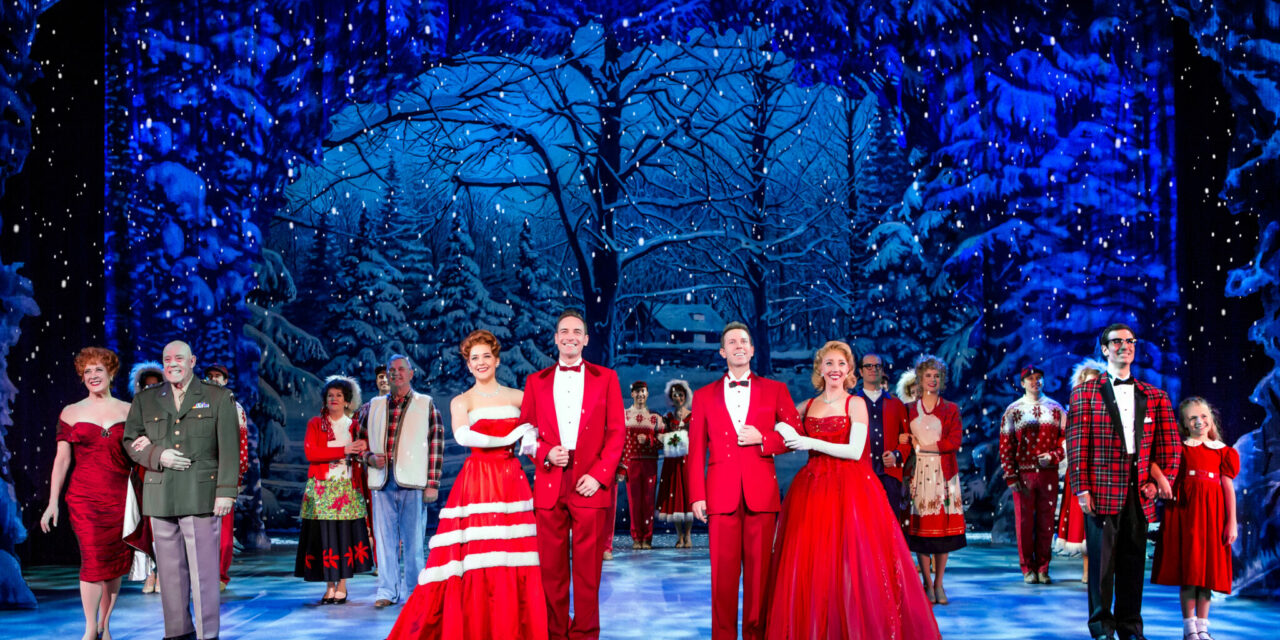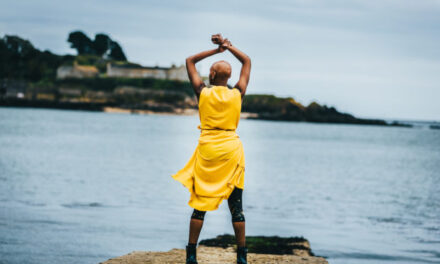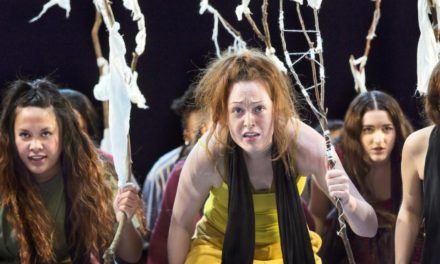When the full company of the touring cast of Irving Berlin’s White Christmas bursts into the title song at the show’s finale, it is an exuberant moment of rich harmony and gorgeous staging—the perfect endcap to a show that is the theatrical equivalent of a store-bought Christmas fruitcake: saccharine, heavy, and a little stale, but quite possibly exactly what someone wants for their holiday nonetheless. With the American Christmas/Holiday season already an odd mix of nostalgia and mania for many, filled with dreams of the Christmases “just like the one I used to know”, theaters are more than happy to provide perennial favorites like The Nutcracker or A Christmas Carol to sate this desire. This stage version of White Christmas does they same by building on some audience member’s acquaintance with the 1954, Michael Curtiz directed film, starring Bing Crosby, Danny Kaye, Rosemary Clooney, and Vera-Allen. However, this newer theatrical adaptation—which premiered in July 2000—has made a few welcome adjustments in its screen to stage adaptation, as well as a mélange of missteps—all in the name of seasonal sentimentality.
For the unfamiliar, Irving Berlin’s White Christmas is the story of two song and dance men, named Bob Wallace and Phil Davies (played here by David Elder and Jeremy Benton), who served in the army together and have since gained some success on the road with their act. Davies, a consummate flirt and womanizer, sets-up a meeting between the self-serious Wallace, himself, and a “sisters act”, who are looking for a leg-up in the industry. The sisters, Betty and Judy Haynes (Kerry Conte and Kelly Sheehan) impress Wallace and Davies as performers, but even more exciting to Davies and busybody Judy is the possible spark between Wallace and equally self-serious Betty. In a strange hairbrained scheme, Davies surreptitiously adjusts his and Wallace’s travel plans from a sunny Christmas holiday in Florida to wintery Vermont at a mountaintop inn that engaged the Haynes sisters as performers. When the group of performers arrive in Vermont, they find an inn bereft of guests due to a particularly hot and dry winter, which means that the sisters may be out of work. By chance, the beleaguered inn is run by Wallace and Davies’ old army commander, General Waverly (Conrad John Schuck). Wallace and Davies stage a massive performance and secretly invite former army buddies to honor the General and save the inn.
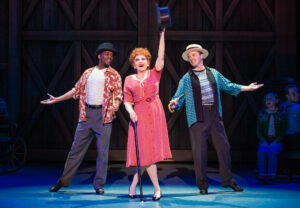
Lorna Luft and the cast of Irving Berlin’s White Christmas. Photo: Jeremy Daniel
(Instagram @JeremyDanielPhoto)
As an adaptation, the musical comfortably transitions to the stage with a few minor narrative adjustments by David Ives and Paul Blake. The characters of General Waverly’s housekeeper Martha Watson (played bombastically by Lorna Luft) and Waverly’s granddaughter Susan (played by Kyla Carter or Emma Grace Berardelli) are greatly expanded and not always to the play’s benefit. Ives and Blake fall into the trap of writing Susan as simply cute and precocious, which gives the young performers little to work with and falls into all the clichés of young child characters as blithely clever and overly eager. As for Martha, she is given more to do than in the movie, including a rousing cane and top hat number, which Luft carries with great success. Unfortunately, the book also gives Martha a bevy of creaky sarcastic zingers that Luft doesn’t carry as well; mostly because so many of the quips are leaden and that’s a lot to ask of any performer.
Thankfully, the adaptation updates some of the more troublesome elements of the movie. A few songs from the film are excised, such as “I’d Rather See a Minstrel Show”/”Mister Bones”, for obvious reasons and the strangely funny song “Choreography”, which barely fit in the movie as it is. Also, the build to the song, “Count Your Blessings (Instead of Sheep)” makes more sense in this adaptation than in the film. The scene still occurs on a sleepless night for Betty and Wallace but instead of getting warm milk for Betty and paternalistically singing this lullaby to her as he does in the film—and seemingly infantilizing a woman said to be about his age—Wallace sings it to young Susan, as she too is having difficulty sleeping.
Finally, Ives and Blake expand the show by adding songs from other musicals to fill out the show, such as “I’ve Got My Love to Keep Me Warm” and “Love and the Weather”, which don’t always work narratively but are fun to hear nonetheless. Larry Blank’s musical arrangements are lovely and the dancing a delight. One number highlights some of the strongest elements of director/choreographer Randy Skinner’s work, especially when he is restrained. In the first act, while Wallace, Davies, and the Haynes sisters are on the train to Vermont, they strike up the very silly “Snow” song, singing about the simple pleasures of those ice crystals covering the winter landscape. As the song grows, almost the entire cast shoves themselves into the small train car to obsessively sing about this weather condition. It is a moment that is funny because of its steady build, its tight choreography in the tiny space, and sharp direction.
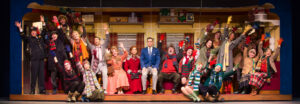
The cast of Irving Berlin’s White Christmas. IBWC. National Tour Company. Jeremy Daniel Photography, 2016.
The cast, for the most part, are game for this trip down memory lane of a show. Two performers should be noted for very different reasons: Jeremy Benton’s Phil is strangely wooden as he mugs so very much and many of his quips simply fall flat. Conrad John Schuck’s General Waverly, on the other hand, reads as lived-in, charming, and carefully drawn. With his crisp baritone and seemingly natural vulnerability, his final speech certainly held the audience in thrall.
In all, the show feeds on a very Anglo-Saxon sense of American nostalgia, tied to an old fashioned, almost simplistic heterosexual love story, with uncomplicated patriotism—all wrapped in the bombast of the musicals of old. For many in the audience, Irving Berlin’s White Christmas seemed to be just be what they needed to lift their holiday spirits. Others, like me, left a little befuddled. And that is simply how the holidays are; some need the twinkling lights, the snow, and all those trappings of a perfect holiday. And some of us just don’t like or need the fruitcake.
Irving Berlin’s White Christmas is playing at the Wang Theatre in Boston December 17-19, 2019. Additional information can be found here.
This post was written by the author in their personal capacity.The opinions expressed in this article are the author’s own and do not reflect the view of The Theatre Times, their staff or collaborators.
This post was written by James Montaño.
The views expressed here belong to the author and do not necessarily reflect our views and opinions.

